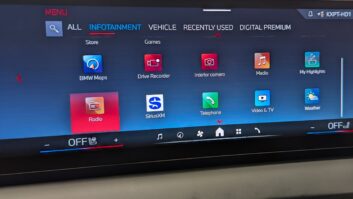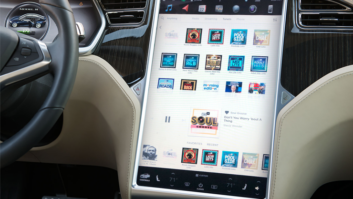For more than a year, Ibiquity officials have been working with NDS, a technology contractor, to develop a conditional access feature for HD Radio.
With field testing underway at a Florida public station, some proponents hope conditional access is the next big feature for HD Radio and think receivers that can handle the capability may be available by the end of the year. Much must happen to make that a reality.
With conditional access, the ability to hear or see certain content on a digital signal is limited to consumers who have the appropriately “unlocked” receivers. The technology is envisioned as a new use for stations’ multicast channels, not their main digital channels, supporters say. Several companies involved in testing the concept were part of the project that helped push multicasting to market.
Numerous uses for conditional access have been cited. Stations could sell one-time paid access to audio events or provide upgraded audio quality for existing radio reading services for the visually impaired. Stations could offer spectrum to benefit emergency communications by first responders. They could sell software updates to car navigation companies or establish channels where parents could better control access to content.
Access to reading services would still be free to listeners who qualify, backers say. But whether regulators should allow commercial stations to charge for other content carried within their spectrum has not been widely debated and the question could be contentious.
Proponents said they’ve discussed whether the FCC would need to approve the use of a multicast channel that involves charging the listener, but don’t agree on whether it would be controversial.
Secure content
Several years ago, the International Association of Audio Information Services approached Ibiquity about ways to incorporate radio reading services onto the IBOC platform. Ibiquity in fact had been considering such a use and built the necessary “hooks” into its technology, several proponents said.
Radio World reported last summer that Ibiquity had contracted with NDS to develop conditional access capability for HD Radio. This is NDS’ first foray into radio. The company specializes in secure content technology “any time, anywhere, for any device,” according to its Web site.
Based in the United Kingdom, it developed conditional access technology for cable and satellite TV and has been deploying such systems since 1987; its clients have roughly 70 million subscribers. DirecTV in the United States and subscription television service BSkyB in the United Kingdom are notable customers, according to NDS Director of Data Applications Delivery Tom Rucktenwald.
While NDS and Ibiquity officials have been talking for roughly two years, they said development of a conditional access feature for HD Radio has been a priority for the last 12 months.
NDS will offer its system for purchase at the NAB2007 convention. The conditional access technology for HD Radio is considered NDS intellectual property, Rucktenwald said. It will provide enabling technology for the Importer to Ibiquity and equipment manufacturers for free, he said; that will be included in the next Importer release.
“We have agreements from NDS to make the technology available in perpetuity at fair, reasonable costs,” said D’Angelo. “We don’t own their IP. The agreement allows us to commercialize their technology as needed to support this service.”
The companies declined to estimate how much the technology would cost a typical station to implement. Product pricing had not been announced in early March.
As part of the development/commercialization process, Harris and Broadcast Electronics plan separate field tests of the technology (see story, page 10). Harris tests were planned to begin in March and continue through part of May; BE’s were to begin after NAB2007.
NDS and Ibiquity said they are prepared to support any partners interested in similar tests and that software would be made available to them. Licensed vendors of Ibiquity transmission hardware include Nautel, Continental, Continental Lensa and R.V.R. Elettronica. The technology can be used with HD Radio worldwide, said Ibiquity Vice President of Advanced Services Joe D’Angelo.
What it is
Conditional access requires scrambling and descrambling a broadcast signal, then informing the receiver that it is capable of getting the programming.
“If I’m not entitled, I don’t get the programming, because it’s scrambled and my box is looking at it and saying, ‘How am I going to figure this out?’” said Rucktenwald. One or more multicast channels can be scrambled, or “decrypted.”
Stations that wish to use conditional access typically would need two pieces of NDS hardware to support the software, mating units called the Initiator and Protector.
The Initiator is something of an administrative control unit; the Protector scrambles the signal, Rucktenwald said. Both are installed ahead of the Importer in the air chain of a station with an HD Radio Importer of second generation or later. The Importer would require a software upgrade to accommodate conditional access.
Each station involved needs a Protector to scramble the signal. A standalone station would have one Protector and one Initiator. A group owner might choose to place an Initiator at headquarters, controlling Protectors at each station, although it also could opt to install both units at all stations and use another device to control them, Rucktenwald said. He declined to provide further details prior to the NAB convention.
Radio is harder than TV
Designing conditional access technology for radio was challenging, D’Angelo said, because radio is a “distributed environment.” In pay television, usually one service provider has nationwide reach and can control all aspects of authorizing receivers.
Satellite radio companies also use such a system, though they contract it to third parties.
In terrestrial radio, the conditional access system would need to serve radio groups, standalone stations and program syndicators.
“This is why we’re doing we’re doing these pilots. We want to get it in the field and make sure all the backend systems hang together and that the transmission performs as expected,” said D’Angelo. They also want to make sure the entitlements are delivered in a reasonable amount of time.
How stations would “permission” receivers and who would be involved in that process are among details to be worked out if conditional access flourishes. The mechanics, however, are in place. To present content to the user, a receiver would be “entitled” or “permissioned” via its electronic serial number to de-scramble the signal. Satellite radio receivers work in much the same way. The NDS system incorporates this function.
“With a PC networked to the NDS box, you will be able to turn the receivers on and off,” said Hal Kneller, senior manager of public radio initiatives for Harris. Using a personal computer loaded with NDS software, a station can turn its conditional access capability on and off over an Internet browser window, Kneller said.
Possible uses
Proponents have bandied about potential uses for conditional access. Most often mentioned is the migration of radio reading services from FM subcarriers onto digital multicast channels. Presumably proponents will pitch the public service aspects of conditional access to the FCC when the concept is discussed with the agency.
The conditional access technology would enable reading services to maintain a copyright exemption for material volunteers read over the air because only qualified visually impaired or hard-of-hearing people could gain access to the programming.
Equally important, with conditional access, reading service users could listen on next-generation HD Radios instead of the specialized SCA-capable units they use now. Current HD Radios could not be retrofitted for this purpose, D’Angelo said.
In order to allow receiver makers to add conditional access to radios in the future, Ibiquity needs to add a security chip into its reference design. The chip is being finalized.
“We will have a reference module that has hardware designed into it,” said D’Angelo. “We will make that available to receiver partners.”
A number of receiver makers have expressed interest in making the new radios, he said. “In the future, we will work with our chip partners to remove the need for that external chip, and just make this standard functionality on all HD-R chips.”
D’Angelo said the difference in cost would be nominal and he doesn’t believe it would affect the retail price.
Sources said if chipmakers balk at the additional cost, receiver manufacturers might hold off until there’s strong demand for the feature.
The back story
Reading services long have sought less expensive, more efficient ways of reaching their users. By being included in the IBOC platform, they would no longer have to buy and deliver specialized SCA receivers.
“To Ibiquity’s credit they put everyone together to see how quickly they could do something” when reading services asked for this functionality, said Mike Starling, NPR chief technology officer and executive director of NPR Labs. “Reading services serve about 1 million handicapped users.” Starling was honored by IAAIS in 2004 in part for representing its cause to regulatory bodies and ensuring the inclusion of reading services in digital radio services.
He mentioned another possible use of conditional access: Commercial stations could develop a “safe harbor” from indecency.
“I think pay channels are farther down the road. I think what would really happen is stations would be able to restrict channels that have content inappropriate to kids … like a channel blocker,” implying that racy content could be moved to a multicast channel with appropriate channel-blocking capability.
Or, Starling said, a noncom station could create a “pledge-free” channel whereby a generous noncom donor could access programming without listening to underwriting pitches at pledge time.
Tom Dollenmayer is station manager for radio and TV at WUSF Public Broadcasting in Tampa, the site of the first field tests. He noted the “pledge-free” concept and said executives at his station are discussing how to program a conditional access multicast channel the other 50 weeks of the year.
Another use, according to D’Angelo of Ibiquity: upgrading certain operational or consumer electronics systems for a fleet of cars. He cited the example of a navigation system.
Currently, when maps for many navigation systems change, it takes about 18 months to complete the updates and distribute them on DVDs at auto dealerships. That process could be simplified and faster using HD-R to transmit data directly to the permissible radios in the dash, D’Angelo said.
Yet another possibility involves first responders. “During an emergency, you may want to take over part of a multicast service and broadcast information only to first responders. This is something we think is infinitely doable.”
At least one source said the technology could bring Howard Stern back to terrestrial radio, because stations could create two versions of the same content, a “smutty Howard” channel and a “clean Howard” channel.
Broadcasters would have flexibility in how they use the feature; a given channel could carry programming that is conditionally accessible at some times and free to air at others, Rucktenwald said.
Will FCC question it?
Beyond reading services, how might stations use conditional access without crossing regulators?
Early opinions were mixed on this question. Several sources pointed to the precedent of terrestrial TV stations offering pay services on some of their multiple digital channels.
Others feel the issue does raise policy questions, given the high value of spectrum. “The question is how do you tax that,” one source said.
Ibiquity Senior Vice President/General Counsel Al Shuldiner said the company hasn’t discussed the concept with the commission because the technology is still under development but that it has regular discussions with FCC staff.
“I’m sure when conditional access becomes available, we’ll be available to come up with the right solutions. I’m not sure what concerns they’ll have … (however) we’ll be ready to help work through that with them.”
D’Angelo said the companies hope to complete field studies and have software and hardware available for transmission and receiver makers by August. If that timeframe holds, by the end of the year stations could be using conditional access, and receivers would be available.
Yet to be undetermined was whether Ibiquity would charge for the necessary Importer software upgrades.







